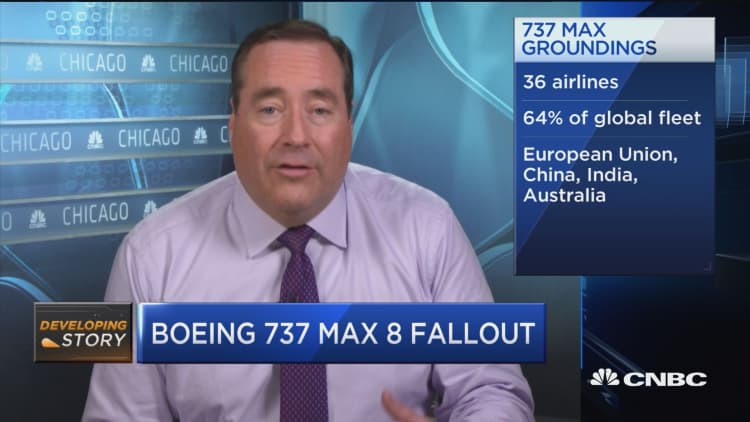
The Dow Jones Industrial Average fell on Tuesday as shares of Boeing posted another sharp decline amid worries over the safety of one of its most popular airplanes.
The 30-stock index closed 96.22 points lower at 25,554.66, with Boeing accounting for about a 150-point drag. (In other words, the Dow would have been higher without Boeing's loss.)
Boeing shares fell more than 6 percent, eclipsing the 5.3 percent decline from Monday's session and notching their biggest two-day loss since June 2009. Boeing fell after several countries, including China, the European Union and Indonesia, grounded all flights involving the 737 MAX model. The plane has been involved in two deadly crashes in less than six months, including one on Sunday. Edward Jones also downgraded the stock to hold from buy, citing a possible "delay in orders" after the Ethiopian Airlines crash on Sunday.
Dow (RHS) and Boeing (LHS) intraday
Source: FactSet
The broader stock market rose, however, after the release of key inflation data. The closed 0.3 percent higher at 2,791.52, led by gains in the utilities and health care sectors. The Nasdaq Composite advanced 0.44 percent to 7,591.03.
Apple rose more than 1 percent, lifting the S&P 500 sector by half a percent. Tech is now the best-performing sector for 2019, gaining 15.3 percent for the year.
The U.S. consumer price index rose 0.2 percent in February, matching expectations. The so-called core CPI, which strips out food and energy, fell short of estimates by gaining just 0.1 percent.
"Services inflation is offsetting no price pressures on the goods side," said Peter Boockvar, chief investment officer at Bleakley Advisory Group, in a note to clients. "As wages are rising, which depending on productivity, we can't keep our eye off the inflation ball, especially with services inflation already running almost 3%."
"The Fed has license to remain 'flexible.'"
The Federal Reserve indicated earlier this year it would be "patient" in raising rates, fueling a market rally to start 2019. The S&P 500 is up 11.36 percent through Tuesday's close, while the Dow has gained 9.55 percent.
Stocks rose on Monday as strong gains in tech firms like Apple and Facebook offset Boeing's steep decline. Better-than-expected January U.S. retail sales numbers also gave a boost to confidence, after a raft of weak December data.
Monday's moves came after U.S. major indexes posted their worst weekly performances of 2019 amid growing concerns of a possible economic slowdown around the world.
However, the previous session's rally should help equities resume their upward trend, said Mark Newton, managing member at Newton Advisors.
"The act of getting back above prior week's lows at 2767-72 along with surpassing trendline resistance should produce a lift to test and exceed March highs," he said. "Breadth proved to be far stronger yesterday on the upside than any of the down days last week."
In the U.K., the British pound gyrated after Prime Minster Theresa May's Brexit deal suffered a second defeat in Parliament. The pound briefly threatened to go higher before trading back down by more than half a percent.
The deal was defeated by 149 votes. Luca Paolini, chief strategist at Pictet Asset Management, said a defeat by this big of a margin increases the possibility of the U.K leaving the European Union without a deal.
"If there is no deal, there could be a recession since the EU is the U.K.'s biggest trade partner," Paolini said. "There could even be food shortages; nobody is really preparing [for a hard Brexit]."
—CNBC's Spriha Srivastava contributed to this report.


